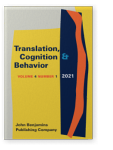Vol. 4:1 (2021) ► pp.47–73
What does professional experience have to offer?
An eyetracking study of sight interpreting/translation behaviour
This study investigated the impact of professional experience on the process and product of sight interpreting/translation (SiT). Seventeen experienced interpreters, with at least 150 days’ professional experience, and 18 interpreting students were recruited to conduct three tasks: silent reading, reading aloud, and SiT. All participants had similar interpreter training backgrounds. The data of the SiT task are reported here, with two experienced interpreters (both AIIC members) assessing the participants’ interpretations on accuracy and style, which includes fluency and other paralinguistic performance. The findings show that professional experience contributed to higher accuracy, although there was no between-group difference in the mean score on style, overall task time, length of the SiT output, and mean fixation duration of each stage of reading. The experienced practitioners exhibited more varied approaches at the beginning of the SiT task, with some biding their time longer than the others before oral production started, but quality was not affected. Moving along, the practitioners showed better language flexibility in that their renditions were faster, steadier, and less disrupted by pauses and the need to read further to maintain the flow of interpretation.
Article outline
- 1.Introduction
- 2.The present study
- 2.1Participants
- 2.2Materials and experimental design
- 2.3Procedure
- 2.4Data analysis
- 3.Results
- 3.1Global indices: Task- and trial-based performance
- 3.2Local reading indices: Word-based eyetracking data
- 3.3Experienced practitioners’ advantages in SiT
- 3.3.1Reading ahead: Flexibility afforded by experience
- 3.3.2Interpreting behaviour in the process
- 4.Discussion
- 5.Conclusion
- Notes
-
References
